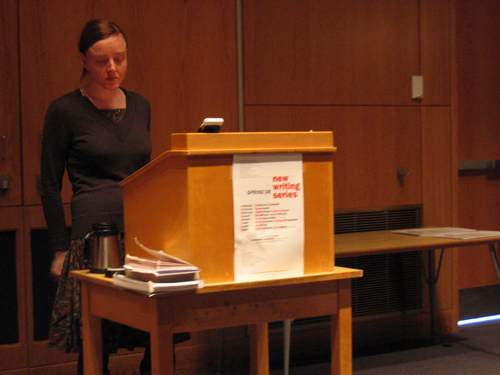Poets Rodney Koeneke and Benjamin Friedlander read to an audience of approximately fifty people in the New Writing Series on 4 April 2008. The event, introduced by Steve Evans, was recorded on digital videotape (vhs and dvd duplicates available soon) and, thanks to Rebecca Griffin, hi-end audio. Full set lists follow the photo gallery below.
PHOTOS
Benjamin Friedlander addressing the NWS audience

Rodney Koeneke introducing a poem

Koeneke dons his neo-Benshi garb

Koeneke and Friedlander entertaining questions from the audience

(photos by Jennifer Moxley)
SET LISTS (compiled by Katie Lattari)
Benjamin Friedlander
– “It’s a pleasure to read for the home crowd…”
– Reads works in translation, originally in either German or Italian; then proceeds to his own poems
1) The Fox, the Cook, the Cock (translation)
2) Prayer of Exhortation or Encouragement (translation)
3) To Set Your Mind at Rest (translation)
4) Afternoon with Circus and Citadel (translation)
5) Brecht (translation)
6) History lesson
7) The Social Contract
8] Urban Renewal
9) Network News
10) Dictation
11) The Mind is a Bubble Sheet
12) The Emergency Broadcasting System
13) Dedication
14) Patriot Days
15) When a Cop Sees a Black Woman
16) Biological or Social Female Parent of a Child or Offspring and Its Poetry
17) Somebody Blew Up America
18] Hillary Duff
19) Fame
20) The Chinese Written Character is a Medium for Poetry
21) Beloved
22) Eliot
23) Me and My Gang
24) Charmed
25) Drew’s Old
Friedlander’s Commentary
– The poem “Hillary Duff” as his “statement on poetics”
– “Fame” is in memory of a friend; “may be my first FLARF elegy”
– “The Chinese Written Character is a Medium for Poetry”: “for Burt and Sylvester if only they were here”
– “Charmed” is a “Birthday Poem”: “My favorite thing about FLARF is the Birthday poems”
Rodney Koeneke
epigraph for this reading, derived from the sign of the University Inn: “Laughter is the sun that drives winter from the human face”
from Rouge State
1) #50 Summer Acrostic Hotshot
2) #39 How to Find Safe Passage
3) #21 Sweethearts of what rodeo?
from Musée Mechanique
4) Afterword
5) Use Dips to Initiate
6) Pizza Kitty
7) Chary as Gary
8] In Memory of My Feelings
9) The World is Loud
10) Europe. Memory. Squid Parts. Grace.
11) The Adorno Corollary
from “Etruria” (manuscript)
12) ben friedlander
13) Rules for Drinking 40s
14) chinoiserie
15) Etruria
Film/ poetry “neo-benshi” performance for Guru Dutt’s film Pyaasa (1957)
Koeneke’s Commentary
-On “The Adorno Corollary”: the poem is referencing Adorno’s famous statement about poetry after Auschwitz
-On “Ben Friedlander”: this is a birthday poem
-On “Etruria”: “FLARF, like soylent green, is people”
Questions
1) How do you use Google searches to help sculpt your [FLARF] poems?
2) (To Koeneke) Do you have any audio files of your poetry available anywhere?
3) For birthday poems, how/ what do you search? Is there a certain way you go about it?
4) How much FLARF do you write in comparison to non-FLARF poetry?
5) (To Koeneke): How long did it take you to write the “neo-benshi” piece?
6) (To Koeneke): Are you striving for persona-type poems?
7) Do you think writing can change things?
8] To Koeneke): You like performance—do you have any background in theatre?









